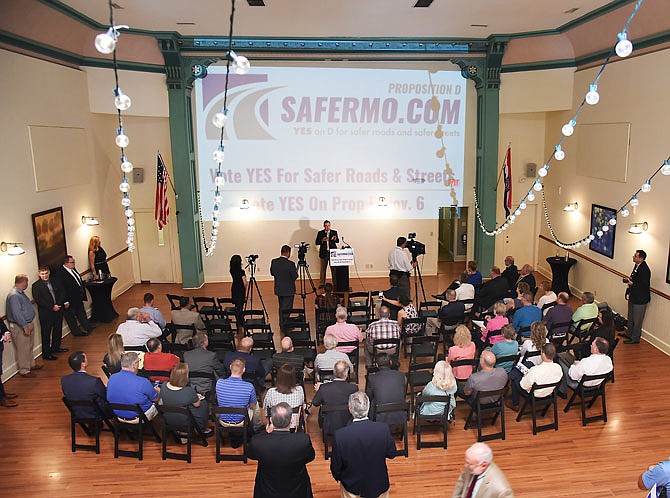A new 10-cent motor fuels tax on the Nov. 6 ballot is reasonable and should be passed because it puts the burden of fixing the state's crumbling highways on users of the roads, state and local leaders said Thursday.
The event, held by the campaign to pass the law and the Missouri Association of Realtors, brought Republican Lt. Gov. Mike Kehoe, a bevy of state legislators and Jefferson City Mayor Carrie Tergin to the Revel Catering & Event Center at 102 E. High St.
Kehoe said it's the right time to pass the initiative even though past attempts to raise the fuels tax failed.
"It's the right thing to do," Kehoe said. "I think it's reasonable. It truly is a user fee."
On the final day of the legislative session, the General Assembly approved the proposed fuels tax increase but decided to send it to voters for final approval. Missouri Proposition D asks voters to amend state law to raise the state's 17-cent motor fuels tax by 2.5 cents each year during a four-year period.
If passed, law enforcement could receive at least $288 million in new revenue through the Missouri State Road fund, according to ballot language on the website of Missouri Secretary of State Jay Ashcroft's website. An additional $123 million could be generated each year to fund construction and maintenance projects for local governments, the ballot language states.
The law will not take effect if a majority of voters do not approve the increase.
Scott Charton, the communications director for SAFERMO.com, the group behind the push to pass the measure, said state statute dictates funds raised by the bill can only be used on law enforcement, road projects and to cover costs for the Missouri Department of Revenue to administer the tax. If passed, 70 percent of new funds would be allocated to statewide uses, Charton said. Local governments would receive 30 percent of new funds raised.
Kehoe said state and local governments need the money.
About 2,100 state and locally owned bridges are structurally deficient statewide, Kehoe said. During the first 10 years of the plan's implementation, 1,700 bridges could be repaired with the new funds. Also, about 46,000 miles of roads could be repaired statewide with the new money, he said.
The Columbia-based Missouri Association of Realtors threw its weight behind the measure. Missouri Realtors CEO John Sebree said the trade association raised $250,000 to support the effort. Sebree said the association supports Proposition D because roads, bridges and infrastructure support communities where Missouri residents buy houses.
"Realtors don't just sell houses," Sebree said. "Realtors sell communities. All these things combine, connect and help us make strong communities."
At 34,000 miles, Missouri has the seventh largest highway network in the country, according to the American Society of Civil Engineers. Since the General Assembly last raised the state's fuels tax to 17-cents-per-gallon in 1996, the tax lost about half of its purchasing power, according to the ASCE.
Several attempts to raise the gas tax have been made in the past.
In August 2002, voters rejected a proposed half-cent sales tax increase earmarked for transportation and an increase of 4 cents per gallon to the motor fuels tax. Only 27.5 percent of voters supported the measure. More recently, in 2014, about 60 percent of voters rejected a three-fourths-cent transportation sales tax.
Estimates compiled by MoDOT and provided by Charton showed Jefferson City could receive an additional $677,594 per year after the 10-cent tax is fully implemented in four years. Cole County could receive $624,629. Callaway County could receive $879,677, according to the documents.
Jefferson City Mayor Carrie Tergin said the extra funds would be useful for the city.
"These funds are vital for the city because having safer roads is a key for our community to continue to thrive," Tergin said. "I strongly stand behind Proposition D and hope the community will also embrace this."
Proposition D appeared to clear its final hurdle Wednesday to land on the November ballot.
The Missouri Supreme Court declined a motion to transfer a case challenging the measure's legality from the Missouri Western District Court of Appeals to the high court. The case, brought by conservative activist Ron Calzone, challenged the legality of the measure because Calzone said the goal of the original bill was to provide Olympic medal winners with a tax credit. Along with raising the motor fuels tax, the law would also exempt Special Olympic, Paralympic and Olympic prizes from state taxes.
Calzone said Wednesday his contention with the measure was over the "hundreds of thousands" of dollars Ashcroft's office would spend getting ready for the bill to be on the November's ballot.
Kehoe said he thinks the courts recognized the General Assembly went through proper channels when putting the measure before voters.
"Now the courts cleared the way for voters to decide," he said. "I'm anxious for us to be able to tell our message and let the voters decide."

